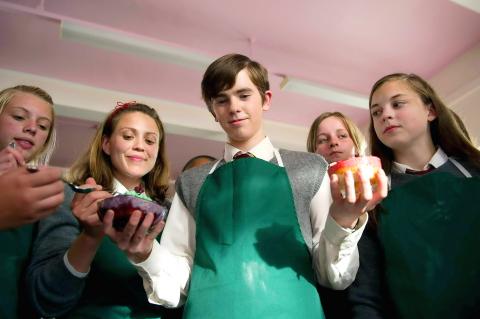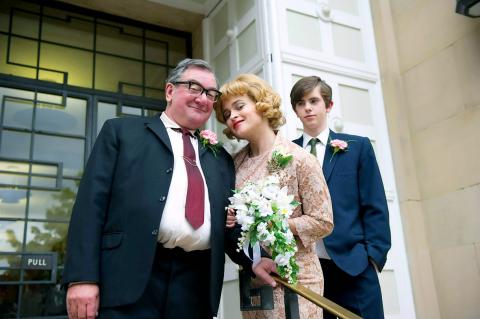Nigel Slater has come to the celebrity chef biopic early with Toast, following close on the heels of Julia Child (Julie & Julia), who has nearly 50 years on him in terms of age, and a vastly greater influence on culinary culture. For all that, Slater is a respected chef, TV personality and food writer whose memoirs of life and British culinary culture in the 1970s are often humorous and saturated with a bitter-sweet nostalgia.
Toast does not enter into the realm of Slater’s professional success, but deals primarily with his childhood in lower-middle-class Britain and the culinary abominations that often passed for food. The players in the story are his father (Ken Scott) and his mother (Victoria Hamilton), an utterly inept cook who is able to destroy canned food and whose backup cuisine at any time of day is the title of the film. Slater clearly ate a lot of toast, and equally clearly, loved it and the woman who made it for him. Slater is played by Oscar Kennedy as a child and by Freddie Highmore as an adolescent, both workmanlike performances, but the real star of the show, and the only reason that the film is worth watching, is the performance of Helena Bonham Carter as Mrs Potter, Slater’s stepmother.
Toast is a sweetly sentimental memory of the gloriously bad old days of canned baked beans, canned spaghetti Bolognese and, of course, buttered toast. It is also a thinly veiled story of a young boy’s discovery that he is gay, which is not surprising given the awfulness of the female characters in the story.

Photo courtesy of Applause
And here again we get back to Bonham Carter’s Mrs Potter, frumpy beyond belief and utterly relishing it. She is a furiously capable home manager and talented cook who has absolutely no time for Slater’s mother fixation and need to command his father’s attention.
There is the germ of an excellent story here, but Toast never really works out whether it wants to be about food, about childhood, about growing up gay in 1970s Britain, or indeed anything else. It wants to be all of these, but the screenplay by Lee Hall, who wrote Billy Elliot, fails to capture the rapture of self-discovery in the same way. This may well have much to do with the personality of Slater himself, who in his current TV shows is wonderfully personable and considerate of his audience, but never seems to give much of himself away.
The trouble with Toast is just that. Slater is perfectly adept at casting his eye over the culinary and social landscape, but is far from willing to engage in any expeditions into his own psyche.

Photo courtesy of Applause
For the foodie, Toast offers even less of an insight into a popular chef than did Julie & Julia, which at least provided some perspective on the influences that created Julia Child as a seminal chef of the 1960s. Slater, for all his reputation, is just one of many professional chefs who has carved out a niche on the networks, and as a media personality he is far from the most interesting of them. So why should we care that he loved his mother, struggled for years to win the love of an uncaring father, and ended up in the kitchens of London, which were just then in the throes of a culinary revolution that had British chefs battling the French for Michelin stars.
Hence the almost inevitable hijacking of the movie by Bonham Carter, who does so much with the thin pickings offered her that although clearly playing the villain of the story (the film ends with a definitive declaration that Slater never saw her again after he left home for London), manages the improbably and slightly disturbing feat of being the least benign but also the most sympathetic character in the film.
It’s almost as though Bellatrix Lestrange suddenly replaced Harry Potter as the main object of our sympathy.
Toast has high production values but no real purpose. It has moments of fine acting, and the direction, by S.J. Clarkson (impressive TV credentials as a director for episodes of Life on Mars, Heroes and Ugly Betty), is more than adequate, but it all seems perfectly made for a rainy afternoon screening on Netflix.

Under pressure, President William Lai (賴清德) has enacted his first cabinet reshuffle. Whether it will be enough to staunch the bleeding remains to be seen. Cabinet members in the Executive Yuan almost always end up as sacrificial lambs, especially those appointed early in a president’s term. When presidents are under pressure, the cabinet is reshuffled. This is not unique to any party or president; this is the custom. This is the case in many democracies, especially parliamentary ones. In Taiwan, constitutionally the president presides over the heads of the five branches of government, each of which is confusingly translated as “president”

Sept. 1 to Sept. 7 In 1899, Kozaburo Hirai became the first documented Japanese to wed a Taiwanese under colonial rule. The soldier was partly motivated by the government’s policy of assimilating the Taiwanese population through intermarriage. While his friends and family disapproved and even mocked him, the marriage endured. By 1930, when his story appeared in Tales of Virtuous Deeds in Taiwan, Hirai had settled in his wife’s rural Changhua hometown, farming the land and integrating into local society. Similarly, Aiko Fujii, who married into the prominent Wufeng Lin Family (霧峰林家) in 1927, quickly learned Hoklo (commonly known as Taiwanese) and

The low voter turnout for the referendum on Aug. 23 shows that many Taiwanese are apathetic about nuclear energy, but there are long-term energy stakes involved that the public needs to grasp Taiwan faces an energy trilemma: soaring AI-driven demand, pressure to cut carbon and reliance on fragile fuel imports. But the nuclear referendum on Aug. 23 showed how little this registered with voters, many of whom neither see the long game nor grasp the stakes. Volunteer referendum worker Vivian Chen (陳薇安) put it bluntly: “I’ve seen many people asking what they’re voting for when they arrive to vote. They cast their vote without even doing any research.” Imagine Taiwanese voters invited to a poker table. The bet looked simple — yes or no — yet most never showed. More than two-thirds of those

In the run-up to the referendum on re-opening Pingtung County’s Ma-anshan Nuclear Power Plant last month, the media inundated us with explainers. A favorite factoid of the international media, endlessly recycled, was that Taiwan has no energy reserves for a blockade, thus necessitating re-opening the nuclear plants. As presented by the Chinese-language CommonWealth Magazine, it runs: “According to the US Department of Commerce International Trade Administration, 97.73 percent of Taiwan’s energy is imported, and estimates are that Taiwan has only 11 days of reserves available in the event of a blockade.” This factoid is not an outright lie — that